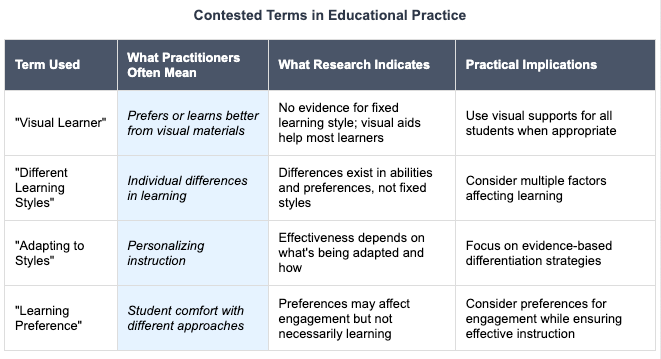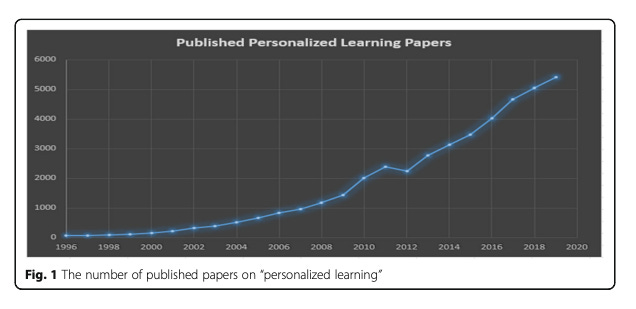Learning Styles won't die
How education's most persistent theory reveals its deepest conflicts
Despite decades of research showing lack of empirical support for learning styles theory, the concept maintains a remarkable persistence in educational discourse and practice. Willingham et al. (2015) report that over 90% of teachers across multiple countries continue to believe in the efficacy of matching instruction to learning styles. This persistence has frustrated educational researchers and led to numerous attempts to debunk these theories.

However, viewing this persistence merely as a failure to accept evidence misses the deeper complexity at play. The ongoing debate around learning styles versus preferences reflects broader patterns in how educational concepts evolve, persist, and remain contested even in the face of empirical evidence. Understanding this persistence requires examining it through the lens of essentially contested concepts and the complex landscape of educational theory and practice.
The nature of contested educational concepts
Educational concepts often exist in a state of ongoing theoretical dispute. As Collier et al. (2006) explain, some concepts are "essentially contested," meaning they inevitably involve endless disputes about their proper uses. These contested concepts are characterized by their internal complexity, diverse describability, and openness to reinterpretation over time.
This contestation reflects education's position at the intersection of multiple domains - psychology, pedagogy, policy, and practice - each bringing different perspectives and priorities. When concepts like "learning" and "personalization" lack unified definitions in the field, it becomes more understandable why practitioners might struggle with maintaining clear boundaries between related ideas like styles and preferences.
The learning styles debate exemplifies this pattern of contestation. While Willingham et al. (2015) conclusively demonstrate the lack of empirical support for learning styles theory, the underlying observation that learners can vary in their approaches remains valid. The confusion between learning styles and preferences emerges from legitimate attempts to understand individual differences in learning, situated within broader contested ideas about personalization and differentiation.
Technology and the evolution of personalization
The emergence of adaptive learning technologies has further complicated these conceptual boundaries. Shemshack and Spector's (2020) systematic review reveals significant variation in how personalization is conceptualized and implemented across educational technologies. They identify multiple competing frameworks for understanding personalized learning, reflecting both technological possibilities and theoretical uncertainties.
Modern adaptive learning systems often integrate multiple approaches to individual differences without clearly distinguishing between styles, preferences, abilities, and other characteristics. This technological context helps explain why maintaining clear boundaries between different types of learning differences has become increasingly challenging. As Shemshack and Spector (2020) note, when adaptive systems respond dynamically to individual differences without rigid categorization, the theoretical distinctions can become blurred in practice.
Furthermore, the rapid evolution of educational technology has created new possibilities for personalization that transcend traditional categorizations. These developments have led to what Shemshack and Spector (2020) identify as an urgent need for more unified frameworks for understanding personalized learning, while acknowledging the complexity inherent in such efforts.
Implications for educational leaders
For educational leaders, several practical implications emerge from understanding learning styles persistence through the lens of contested concepts. First, leaders must recognize that some conceptual confusion reflects genuine complexity rather than simple misunderstanding. This recognition should inform how they approach professional development and institutional change efforts.
Second, leaders need to help practitioners distinguish between unsupported theories (learning styles) and valid observations about learning differences and preferences. This requires developing more nuanced frameworks for discussing individual differences in learning that avoid oversimplified categorizations while still acknowledging genuine variation in how students learn.
Third, leaders should work toward what Shemshack and Spector (2020) call a "unified approach" to personalization while remaining flexible in implementation. This means developing shared understanding within their institutions about how to address individual differences in learning while remaining grounded in evidence-based practices.
Conclusory Remarks
The persistence of learning styles theory reflects more than just resistance to evidence - it represents the inherently contested nature of educational concepts and the genuine complexity of understanding individual differences in learning. Moving forward requires maintaining conceptual clarity where possible while acknowledging that some educational concepts will remain sites of ongoing theoretical and practical negotiation.
Educational leaders can best serve their institutions by fostering sophisticated dialogue about individual differences in learning that moves beyond simple categorizations while still acknowledging the legitimate desire to understand and address student differences. This approach recognizes both the contested nature of educational concepts and the need for practical progress in supporting diverse learners.
References
Collier, D., Hidalgo, F. D., & Maciuceanu, A. O. (2006). Essentially contested concepts: Debates and applications. Journal of Political Ideologies, 11(3), 211-246.
Shemshack, A., & Spector, J. M. (2020). A systematic literature review of personalized learning terms. Smart Learning Environments, 7(33).
Willingham, D. T., Hughes, E. M., & Dobolyi, D. G. (2015). The scientific status of learning styles theories. Teaching of Psychology, 42(3), 266-271.





This is quite literally my biggest pet peeve and the hill I will absolutely die on. I cannot believe is 2025, we still have folx that subscribe to the belief of learning styles.